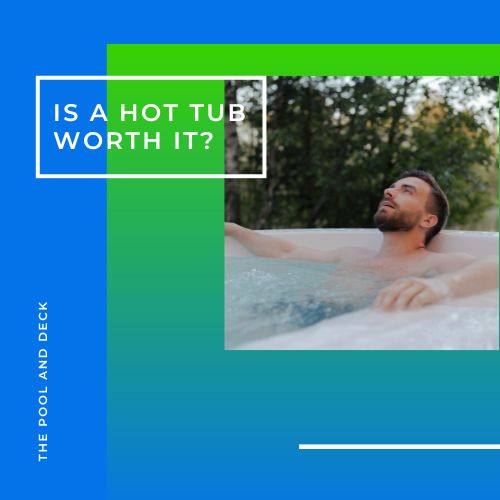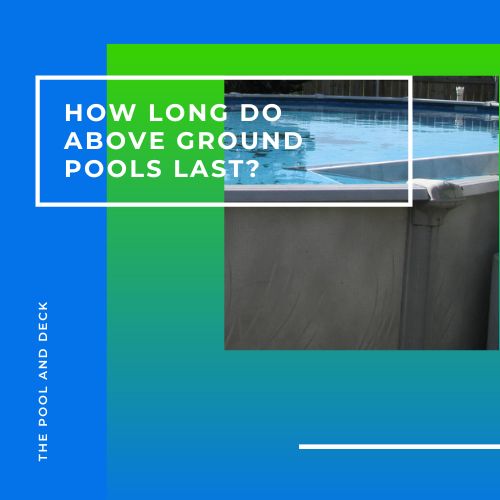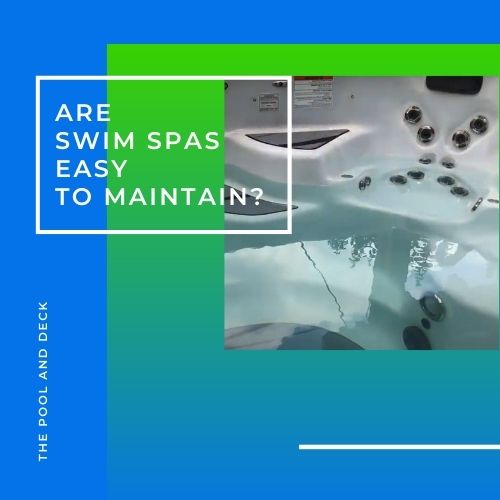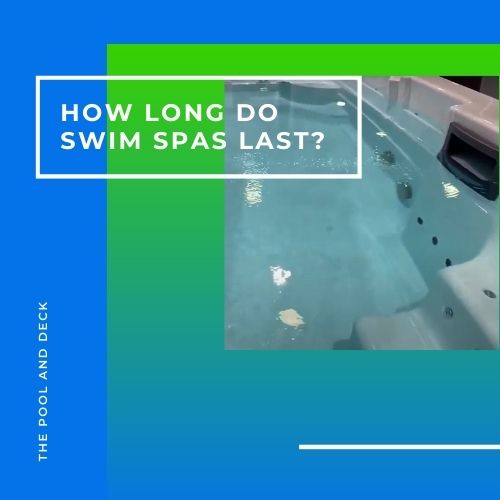Spa Heater To Heat Above Ground Pool? Wait! There are Better Solutions!
As an Amazon Associate, I earn from qualifying purchases.
Table of Contents
Can You Use a Spa Heater to Heat an Above Ground Pool?
Do you already have a spa or a hot tub on your patio and are now considering buying and installing an above ground pool in the backyard? If so you may well ask, “can you use a spa heater to heat an above ground pool”?
Spa or hot tub heater will not be effective in heating up an above ground pool because the water volume and therefore the heat requirement of the pool is many times higher.
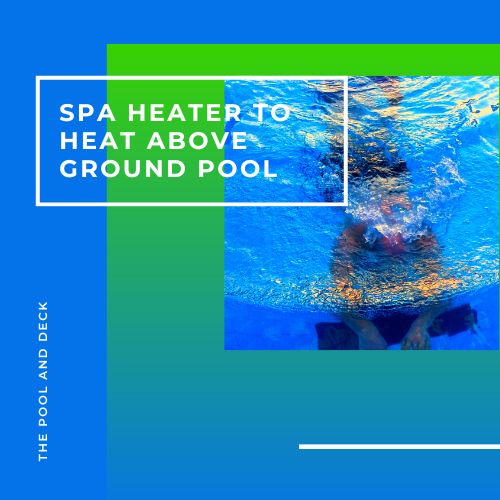
Typically a round above ground family pool is 24’ in diameter and 54” deep. The volume of water in this pool is over 15,000 gallons. On the other hand, the volume of water in a 4-6 person spa or a hot tub is 300-450 gallons.
Simply put, a pool heater must have a heating capacity that is 30X of a spa heater. Only then can you increase the pool and spa temperature by the same degree and within the same time period.
The assumption here is that you wish to increase the temperature of both the pool and the spa by an equal amount.
The reality is that the ideal temperature to relax & enjoy a spa or a hot tub is 100° F while the ideal temperature (according to WHO) for a comfortable & safe swim in the pool is 78–86° F.
If the starting water temperature was 70° F then you would need to raise the pool temperature by 10° F and the spa temperature by 30° F. Even then the pool heater would need to have a heating capacity of 10X of a spa heater.
How Many Kilowatts Are in a BTU?
The heating capacity or the energy consumption of a spa heater is specified in KW whereas the heating capacity of an above ground pool heater or heat pump is specified in BTU.
So when comparing the heating capacity of a spa heater with that of an above ground pool heater we need to convert KW to BTU or vice versa.
The conversion formula for KW to BTU / hr is
BTU / hr = KW X 3,412.14245
Therefore a spa heater rated at 11 KW is approximately equivalent to a pool heater rated at 37,500 BTU. See table below for conversions of some popular models.
Table: KW & BTU/hr of popular pool & spa electric heaters
| Product / Model | Specification | Equivalent KW | Equivalent BTU/hr |
| Hayward Electric Spa Heater | |||
| Item #CSPAXI55 | 5.5 KW | 5.5 KW | 18,766 BTU |
| Item #CSPAXI11 | 11.0 KW | 11.0 KW | 37,500 BTU |
| Hayward HeatPro Heat Pump | |||
| Item #HP50HA2 | 50,000 BTU | 14.7 KW | 50,000 BTU |
| Item #HP70HA2 | 70,000 BTU | 20.5 KW | 70,000 BTU |
| Item #HP31005T | 100,000 BTU | 29.3 KW | 100,000 BTU |
| Item #HP21254T | 125,000 BTU | 36.6 KW | 125,000 BTU |
| Item #HP21404T | 140,000 BTU | 41.0 KW | 140,000 BTU |
How Long Does It Take to Heat a Pool?
The amount of time taken to heat a pool, spa or a hot tub depends on the following factors:
- Volume of water
- Heating capacity of the heater
- Increase in temperature required
BTU (British Thermal Unit) is an unit of energy that is roughly equal to the energy required to heat 1 lb of water by 1°F.
- 1 BTU = 1,055 joules
- 1 BTU = 252 calories
- 1 BTU = 0.293 watt-hours
So let me do a simple calculation to illustrate the point. Let us say you need to heat a pool that has 15,000 gallons of water from 70°F to 80°F and the capacity of your pool heater is 150,000 BTU.
1 gallon of water weighs 8.34 pounds. So the weight of 15,000 gallons of water is approximately 125,000 pounds.
The pool heater with a capacity of 150,000 BTU will take (125,000 / 150,000) X 60 minutes to heat the pool by 1°F and (125,000 / 150,000) X 60 X 10 minutes by 10°F.
This works out to 500 minutes or 8 hours and 20 minutes.
If you were to substitute the pool heater (150,000 BTU) with a spa heater (5.5 KW ie 18,766 BTU) the calculations will change as under:
The spa heater with a capacity of 18,766 BTU will take (125,000 / 18,766) X 60 minutes to heat the pool by 1°F and (125,000 / 18,766) X 60 X 10 minutes by 10°F.
This works out to almost 4,000 minutes or 66 hours and 40 minutes or 2 days, 18 hours and 40 minutes.
I am sure you have no plans for waiting that long to get into a comfortable pool.
In short, it is possible to heat an above ground pool using a spa heater, just not practical!
NOTE: The above calculations are indicative only as other factors like heater efficiency, pool surface area, ambient temperature and wind speed also influence the pool water temperature.
How Much Heat Is Lost from a Swimming Pool?
If your pool was at the ideal swimming temperature in the evening why is it too cold to swim in the morning? The simple answer is that a swimming pool, like any body of water, gains heat during the day from the sun but loses it overnight when temperatures drop.
The rate of heat lost from an above ground pool depends on:
- Difference between pool water temperature & ambient temperature
- Relative humidity
- Wind speed
- Surface area of the pool
The water temperature of an above ground pool, that is left uncovered overnight, could drop by 5°F. Using a good pool cover could cut your heat loss to half!
It makes a lot of financial sense to cover up your pool after using it.
The amount of heat energy that you will need the next day will be lower. Your pool will be ready for a swim faster and you will save on energy costs too!
What Type of Heater Is Best for an Above Ground Pool?
The 5 different types of pool heaters are:
A Gas Fired Pool Heater is not the most cost effective or energy efficient option, but it gets the job done fast. To save operating costs, buy a model that has high efficiency.
- Electric Resistance Pool Heater
An Electric Resistance Pool Heater is easy to install & operate. It may not heat the pool as quickly as a Gas Fired Pool Heater but has convenience in its favor.
A Wood Burning Pool Heater is a great option if you already use wood stoves to heat your house. Being old school it brings a certain rustic charm to heating up your hot tub, spa or a small above ground pool warm, especially in the peak of winter.
A Solar Powered Pool Heater harnesses the energy from the sun, which is free. It is the most cost effective way to heat up your above ground pool warm.
The downside; you have no control on the sun!
The principle on which a Heat Pump Pool Heater works is exactly the same as that of an air conditioner. Just in reverse!
Heat Pump Pool Heaters have a high initial cost but are cheaper to run than gas powered or electric resistance pool heaters.
NOTE: Use a Pool Cover (whenever you can) and a windbreaker (if you can) so that your above ground pool loses less heat!
I recommend using a Solar Pool Cover. The Solar Pool Cover is made of a plastic sheet with air bubbles, much like a bubble wrap.
A Solar Pool Cover, therefore, has high thermal insulation properties. It prevents heat loss from the pool. A Solar Pool Cover can be used, along with a pool heater, to keep your above ground pool warm in winter, more efficiently, at a lower cost.
Apart from insulation, a Solar Pool Cover also reduces heat loss from the pool by reducing water evaporation.

24′ Round 12 Mil Clear Solar Pool Cover – $164.99
from: Pool Splash, LLC
Thank you very much for reading the post. I do hope you found it informative and helpful.

